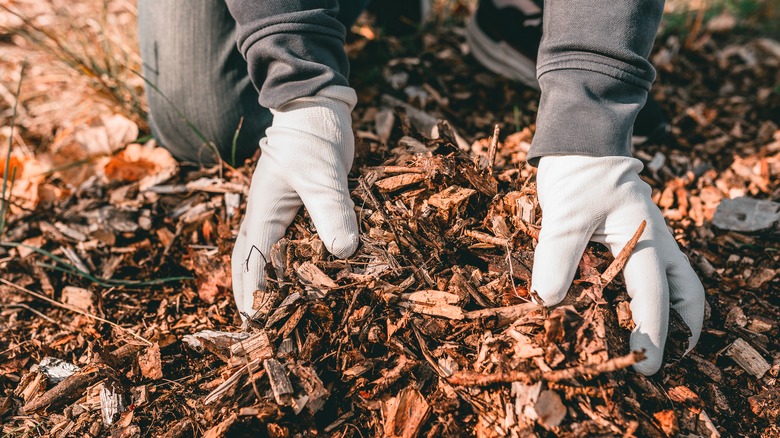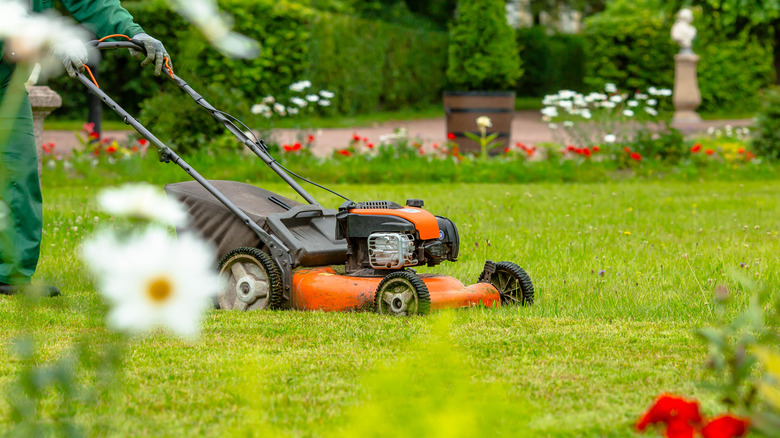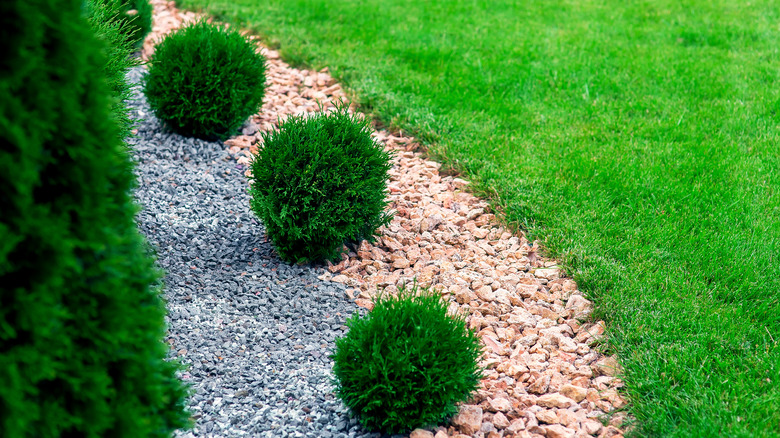Here's What You Can Substitute For Mulch
Mulch is a key component in maintaining garden health. It's a natural defense against soil erosion and provides an equalizing element when it comes to fast temperature swings in the surrounding environment, according to Patuxent Nursery.
Landscaping almost always makes use of a mulching substance, but the traditional wood chips can be hard to come by at an affordable price. With supply chain issues continuing to roll across the United States, per The New York Times, homeowners are seeking ways to substitute many of their typical supplies for other sources that can perform the same role. Fortunately, while many think of mulch as a specific product, a broad variety of alternatives can be used to mulch garden beds or other landscaping features in your yard.
Since mulch is simply a ground covering additive that protects the soil layer and root systems that live beneath it, mulching can be done with nearly any biodegradable substance that you use in the home. Pages from the newspaper or a magazine, cardboard, or any other clean paper products can serve as a mulching object of last resort for a homeowner that hasn't been able to source an alternative. Many gardeners apply a layer of old cardboard beneath new soil additions for the weed-restricting power that mulch aims to introduce. However, it should be noted that only untreated cardboard and black and white newspaper pages should be used as mulch (via True Value).
Grass and leaf clippings from the garden can be repurposed into a wonderful mulch
A substance that many homeowners have in abundance is cut grass — or the ability to create grass cuttings virtually at will. During the summer months, you may even need to mow every week to maintain a healthy and tame lawn. Lawn Love recommends cutting the grass down by a third each time you mow, though each unique grass type and growing location will dictate the specifics of your particular mowing schedule.
Using a grass-catching basket attached to your lawnmower will provide ample clippings that can be used as mulch for other parts of the lawn. In fact, if you don't make use of the basket attachment, the cuttings will naturally mulch the grass itself. The clippings will break down in the location where they were cut, creating a natural fertilization and mulch cycle for the lawn without any active management beyond the scheduled trim.
Another great option is the fallen leaves that descend from the trees on your property each autumn. This organic material serves the same function as the wood-based product that many people buy to protect their soil through the colder months (via True Value). Instead of purchasing bags of mulch, consider collecting all the leaves that fall off your trees, shredding them, and spreading them with the same grass-cutting method.
Rock, gravel, or pebbles make for a long-lasting mulch option
Rock products also make for a great mulching option in certain circumstances. Gravel, pebble, or other rock layers are ideal for soil in areas that see drainage problems on a regular basis, explains Level Green Landscaping. Rock-based mulch products are perfect for increasing the flow of water drainage for planters that won't support active growth in a consistently moist soil environment. Likewise, these mulch products are much longer-lasting than wood or leafy structure-based mulches.
McCarty Mulch reports that homeowners often need to add new bark mulch every year, and many people mulch their garden beds twice each year (in the spring and fall). This is because soft mulch options decompose over time, adding richness to the soil but breaking down and losing the temperature control, erosion protection, and other features that a mulch layer provides. Rock-based mulch doesn't suffer this same fate, and a pebble or gravel layer can provide a highly functional and beautiful addition to the garden for many years without losing its effectiveness.
Although, when applying a rock mulch, you'll need to account for the loss of organic decomposition that an alternative source provides though. Adding plant fertilizer in liquid form is the best way to deliver necessary nutrients through the rock layer (via Xtreme Horticulture).


